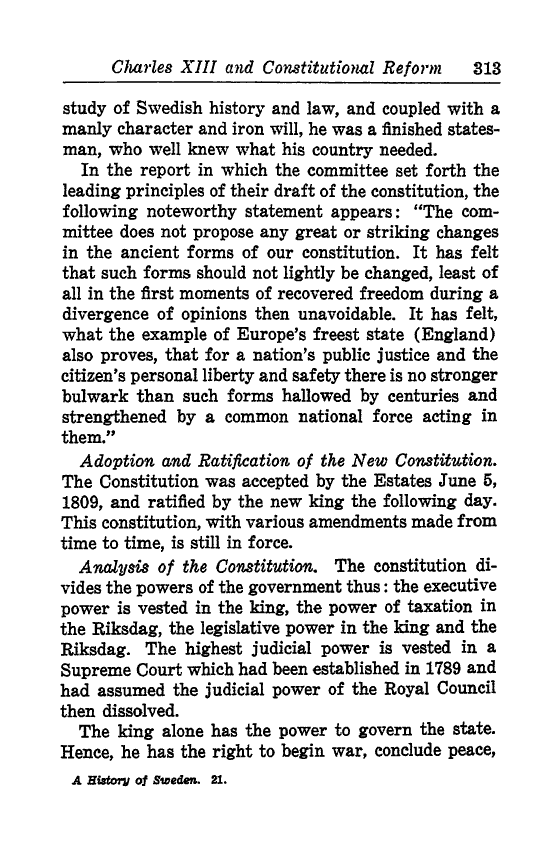
Full resolution (TIFF) - On this page / på denna sida - XVIII. Reign of Chales XIII, 1809–1818 - A. The New Constitution

<< prev. page << föreg. sida << >> nästa sida >> next page >>
Below is the raw OCR text
from the above scanned image.
Do you see an error? Proofread the page now!
Här nedan syns maskintolkade texten från faksimilbilden ovan.
Ser du något fel? Korrekturläs sidan nu!
This page has never been proofread. / Denna sida har aldrig korrekturlästs.
CJiarles XIII and Constitutional Reform 313
study of Swedish history and law, and coupled with a
manly character and iron will, he was a finished states-
man, who well knew what his country needed.
In the report in which the committee set forth the
leading principles of their draft of the constitution, the
following noteworthy statement appears: "The com-
mittee does not propose any great or striking changes
in the ancient forms of our constitution. It has felt
that such forms should not lightly be changed, least of
all in the first moments of recovered freedom during a
divergence of opinions then unavoidable. It has felt,
what the example of Europe’s freest state (England)
also proves, that for a nation’s public justice and the
citizen’s personal liberty and safety there is no stronger
bulwark than such forms hallowed by centuries and
strengthened by a common national force acting in
them."
Adoption and Ratification of the New Constitution.
The Constitution was accepted by the Estates June 5,
1809, and ratified by the new king the following day.
This constitution, with various amendments made from
time to time, is still in force.
Analysis of the Constitution. The constitution di-
vides the powers of the government thus : the executive
power is vested in the king, the power of taxation in
the Riksdag, the legislative power in the king and the
Riksdag. The highest judicial power is vested in a
Supreme Court which had been established in 1789 and
had assumed the judicial power of the Royal Council
then dissolved.
The king alone has the power to govern the state.
Hence, he has the right to begin war, conclude peace,
A History of Sweden. 21.
<< prev. page << föreg. sida << >> nästa sida >> next page >>